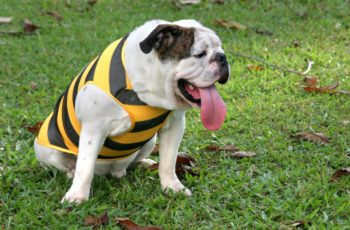
While whining is often an indication of stress, but it’s your dog’s body language that tells you the most. Watch your dog, starting from the tip of his nose. Stressed dogs lick their noses nose and lips frequently, pant (without being hot or having just exercised), and frequently yawn.
Many dogs will avoid eye contact, show white around their eyes (whale eye or side eye), or have dilated pupils. Ears pinned back tightly often indicate an anxious, uncomfortable dog.
Dog Turns Away
Often a stressed dog will turn his head or even his whole body away, likely hoping to avoid any confrontation. He may sniff to appear uninterested in a worrisome situation. His hair may loosen, so he suddenly “sheds” when you pet him in a stressful situation. The tail may be tucked tightly underneath and up against his body. He literally may be shaking or trembling.
The dog may pace, if possible. You may also notice:
- Barking
- Circling
- Compulsive licking at a limb creating a “lick sore”
- Cowering
- Destructive behavior like tearing up his bed or destroying household things
- Diarrhea
- Dilated pupils
- Excessive drooling
- Flattened ears
- Front paw lifting
- Head shaking
- Heavy panting
- House soiling
- Losing control of bladder or bowels
- Loss of appetite
- Low activity
- Nose licking
- Obsessively licking one spot
- Refusing to look directly at something
- Restlessness/pacing
- Scratching himself
- Shut down (withdrawn, unresponsive to stimuli and people)
- Shying away from/refusing to move toward something
- Trembling
- Vomiting bile
- Whining/vocalizing
- Withdrawal from family/less interactive
- Yawning (when obviously not sleepy)
How to Help a Stressed Dog
If you notice any signs of stress in your dog, remove him from what is causing the distress, if possible. That may mean walking away or doing a detour around a scary area. You must be his advocate and step between him and whatever is concerning him, whether it’s people, other animals, or a physical situation. Once he’s moved away and seems to be settling, let him look at the stressor.
Controlling your dog’s stress is a health measure because chronic stress can cause high blood pressure, gastroenteritis, weight loss, delayed healing of injuries, less resistance to infections, and sometimes to the development of obsessive-compulsive habits such as licking or chewing.


